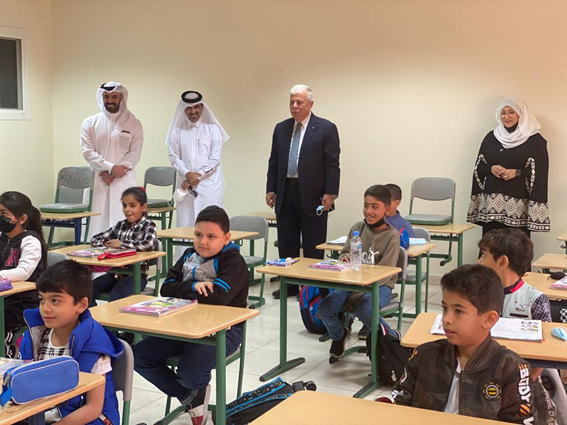How many years of experience do you have as a teacher? What subject do
you teach?
Master degree in Education Leadership from Qatar University, with 18+ years
of experience in the education sector in Qatar. I am the Academic Vice Principal, and my major is both English and Education
Leadership.
How many students are in your class?
Our classrooms
vary in number of students from 11 to 30 students in each class according to
grade.
What is the compulsory education
system in your country? At what age does compulsory education start and end?
6 years of primary education are compulsory. Every Qatari citizen has the
right to a public education that is compulsory and free. The number of
public schools exceeded 207 plus 68 kindergartens in 2019/2020, serving
more than 124,600 Qatari and non-Qatari students.
All public schools in Qatar are committed to teaching basic and integrated
curricula; mathematics and science, Arabic and English, Qatari history
and Islamic education.
The
public school system in Qatar is of 12 years duration, consisting of a 6-year
elementary cycle followed by a 3-year secondary cycle and then a 3-year higher
cycle. The elementary and preparatory levels focus on basic numeracy and
literacy skills. The secondary level of education emphasizes preparing pupils
for university education, vocational or technical training, or for entering the
labor market. |

Directors of EEA and school managers of Fifth Assalam
School observing a primary class
|
Qatar
also offers specialized programs and curricula, such as science, technology and
business to name a few. The public sector also provides a variety of
specialized educational services for students with special needs as well as
gifted and talented students. In addition, Qatar has specialized schools for
those with special needs, those with specialized talent and those who are
interested in a specialized focus and curriculum. Specialized schools include
Qatar Technical School; Qatar Banking Studies and Business Administration
Studies School for Boys; Religious Institute Preparatory Secondary School for
Boys; Qatar Banking Studies & Business Administration School for Girls; and
Qatar School of Science and Technology for Boys, a secondary school. All these
schools qualify students to move to various higher education options and to the
job market after graduation.
Students spend 12 years in public school, divided into several stages.
After going through the pre-school or kindergarten stage students move
to the primary stage that lasts 6 years. The primary stage includes co-educational
schools, boys’ schools and girls’ schools. Second is the preparatory stage
that lasts from seventh grade to ninth grade. The student then moves to
the secondary stage from the tenth grade to the twelfth grade.
At
the secondary school level, students can choose public schools with general
education or specialized schools with a range of options that suit the
student's interests and academic priorities, such as science and technology and
banking.
When does the school year start and end in your country?
It starts on August and ends on June.
| How
many years of experience do you have in iEARN? What iEARN projects have you
done with your students? |
Almost two years now, we worked on two projects: “My Identity Your Identity”
and “Special Place.”
“My Identity Your Identity” and “Special Place” are the two projects which
Fifth Assalam School implemented with students in the iEARN exhibition
after 2 months of online training program for the teachers and the Academic
Vice Principal.
“My
Identity Your Identity” is the second project as the students worked on finding
connections between the 21 nationalities enrolled in Fifth Assalam School and
the subjects they are studying.
|
|
 |
| Teachers and students who participated in
the iEARN project exhibition |
|
Has the COVID-19 pandemic affected your school or your students? Were there any major changes?
Following
the closure of all public and private schools and universities on March 10,
2020 to control the COVID-19 outbreak, EAA and FiAS (Fifth Assalam School)
acted swiftly in designing an effective alternative to the physical classroom,
ensuring that all students are able to continue their learning and not fall
behind in their studies.
The Fifth Assalam School launched a new online learning platform (https://www.fifth-assalamschool.com/). This platform offers digital and interactive resources prepared by a
qualified team of teachers. Students can find many resources on this platform
including interactive books, textbooks in PDF format, video, audio and
many other digital learning materials that enrich the student’s education.
Through this platform, the school aims to boost the learning process of
the students by providing explanation in an interesting and interactive
way, without the constant need to connect to the internet.
For
students who did not have the equipment or access to e-learning, EAA, through
its collaborations with the telecommunications networks in Qatar, has provided
computers, laptops and hundreds of
broadband devices for Internet access to students who needed them for
home-based learning.
|
Regarding the use of ICT, is One-to-One PC being done in your school? Do
your students take those devices home? Do you use them for online classes?
The teaching delivery method that all the school currently approved are
both:face to face education and the online education (through the Zoom
Application for homeschooling students).
The
teachers well prepared their classroom to integrate the students into the face
to face education.
During
the lessons the teachers are displaying PPT slides, word wall games, dictation
on line, spin the wheel, videos, or interactive CD on Whiteboard. As previously
mentioned EAA provided computers, tablets, laptops and hundreds of broadband
devices for Internet access to students who needed them for home-based
learning.
Could you give any messages to teachers in Japan?
We
hope to exchange experiences with you for the benefit of supporting our
students.
|